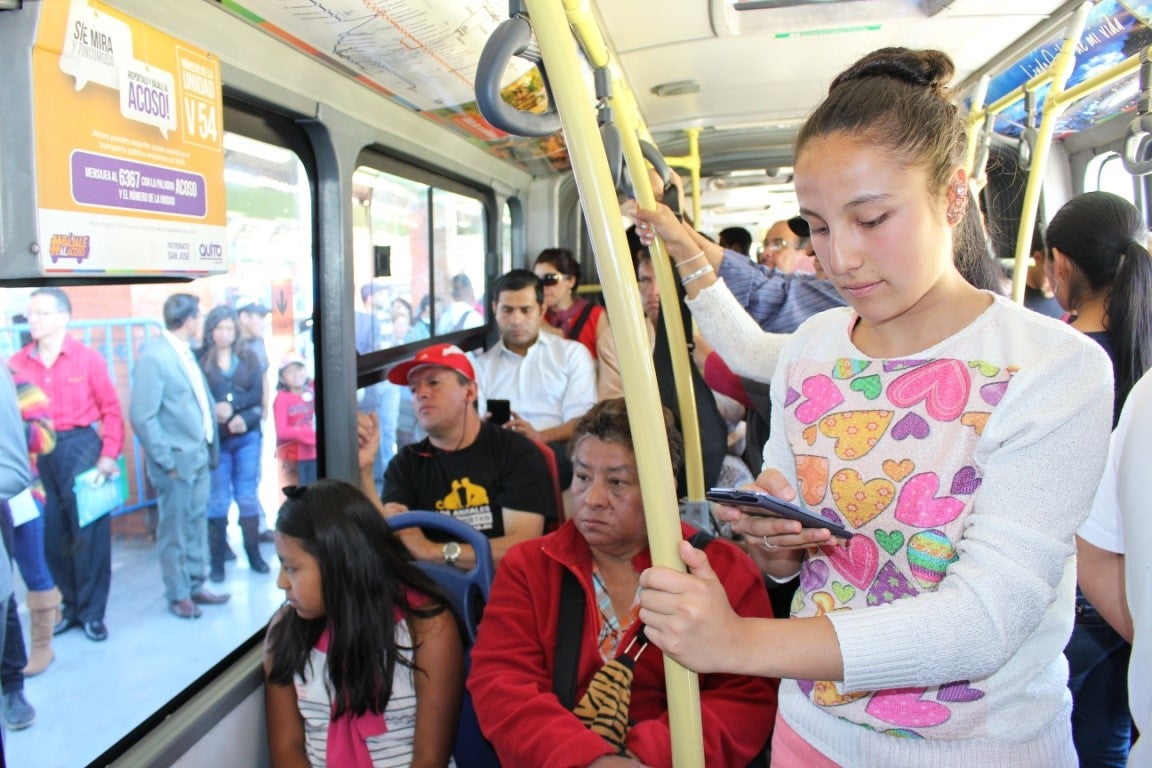Quito promotes Tools to report Sexual Harassment in Public Transport

When the first statistics on sexual harassment in public spaces and public transport were produced in Quito, it became clear that there was a pressing need to act quickly for one simple reason: this problem infringes the basic rights of women and girls to free mobility, access to education, and health. 82% of the women surveyed said they had been victims of sexual harassment in public transport, while 91% reported having been victims of sexual harassment in public transport. For this and several other reasons, in 2014, the Mayor of Quito, Mauricio Rodas, declared the emergency in the Metropolitan Public Transportation System. Since then, the strategies undertaken by the Mayor’s Office to improve the service included an aspect that had not been taken into account in previous years: that of building public transport with a gender perspective and free from sexual harassment against women and girls. This important task was assumed by the Municipal Board San Jose (Patronato San José), entity in charge of executing the social and gender policies of the Municipality of Quito.
Several actions to prevent sexual harassment in public transport have been implemented since 2015, which included both men and women, key actors in the process of behavior transformation. New masculinities was a widely disseminated topic to destroy gender stereotypes and improve coexistence. At the same time, the stops of the Metropolitan Public Transportation System were the scene of educational and communicational campaigns to recognize gender violence, the first step towards change. More than 3,000 people were trained and 200,000 passengers met and were empowered in this first stage.
In March 2017, the Bájale al acoso (Stop Harassment) Prevention Strategy was implemented and has become an effective and visible action. This tool promotes solidarity and coexistence among passengers since, as victims or witnesses of sexual violence, they can report it by sending a free SMS to 6367.
To date, more than 1,400 reports have been handled through calls for support and crisis management. The Mayor’s Office aims at targeting the topic of respect among citizens, but also to highlight the concept of social sanction by transmitting an audio of respect and coexistence that is activated inside the transport units, once an act of harassment is reported. The exercise of social sanction encourages the transformation of behavior and the creation of spaces for healthy coexistence. When we speak of sexual violence against girls and women in transportation as a normalized behavior in the city of Quito, it is considered a challenge to work on the denaturalization of this problem, a challenge that the Municipality of Quito assumes by encouraging social sanctions against these behaviors.
Apart from the social sanction, there is also the legal sanction for illegal acts as provided for in the Criminal Code, in accordance with current national legislation. In the face of these events, Bájale al Acoso (Stop Harassment) provides legal advice and support to the victims, who decide to take the case to court. So far, 43 cases were handled by the Prosecutor-General, where a total of 10 convictions (offenders sentenced to serve prison time between 12 and 36 months) were recorded.
In one year in operation, thanks to this strategy, Quito has become a domestic and international referent. Today, it is one of the cities in the Transport Gender Lab, an initiative of the Inter-American Development Bank, a regional space for sharing good practices in the areas of transport and gender. Bájale al Acoso (Stop Harassment) is 100% operational in urban public transport and 80% of the conventional public transport that covers the urban area of Quito. In the coming months, it will start operating in rural areas.
For social sanctions to generate the expected outcome, it is imperative to prevent through citizen education. For this reason, more than 4,000 people - mostly men and transport system officials - were made aware of the need to identify and change attitudes in order to stop seeing and understanding violence and sexual harassment in public transport as “natural” behavior. These awareness-raising processes are sustained over time and for the next few months a virtual training will be incorporated for the more than 1,900 employees of the company in charge of operations of the Metropolitan Transportation System, including workers, drivers and collectors, on the prevention of gender-based violence.

The challenge of Quito to incorporate the gender perspective in all areas of transformation is applied in the planning and design phase of the first subway line in Quito. This pioneering project in gender mainstreaming is technically and financially supported by the World Bank. Municipal Board San Jose is working to make this initiative a reality:
- Employment for women in management, administration, technical and operational areas (unconventional jobs)
- Raise awareness among officials of the transportation system on assistance and prevention of sexual violence
- Inclusive and gender-sensitive infrastructure
- Empowerment of women in the prevention and reporting of violence and sexual harassment
- Education and communication campaigns to prevent sexual harassment
In 2017, the first awareness-raising actions were targeted at developers of the subway system on the main construction sites. The process involved more than 1,500 men working in the construction of the Subway System to raise awareness on the different forms of sexual violence against women and prevent harassment in public spaces.

Undoubtedly, Quito has made great strides in the prevention of gender-based violence and the construction of a city with equal opportunities. These strategies and concrete actions have been recognized in recent years at the local and international level, based on concrete actions that respond to the day-to-day needs of citizens.
 Login
Login